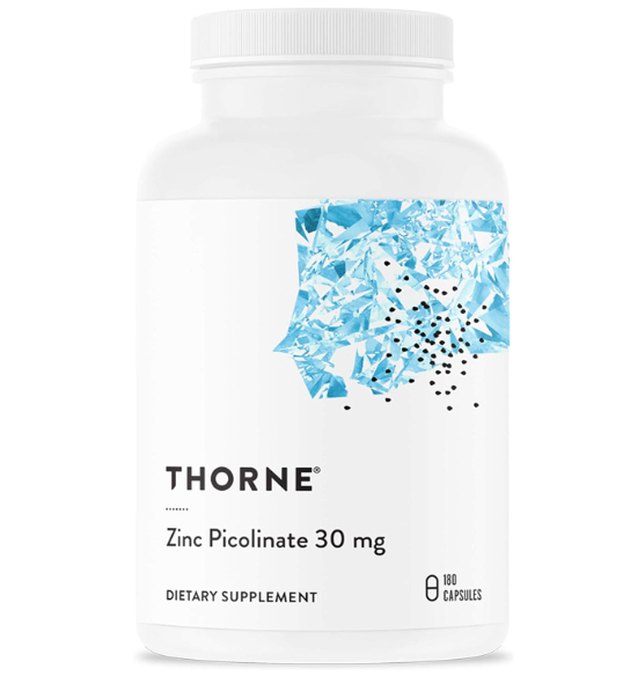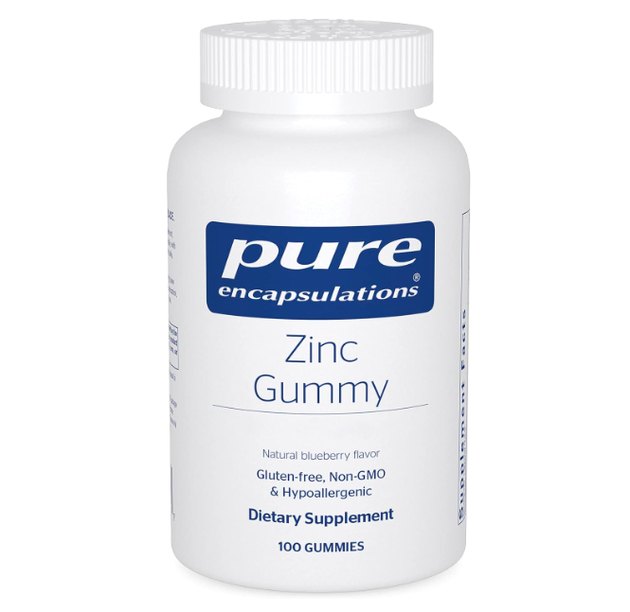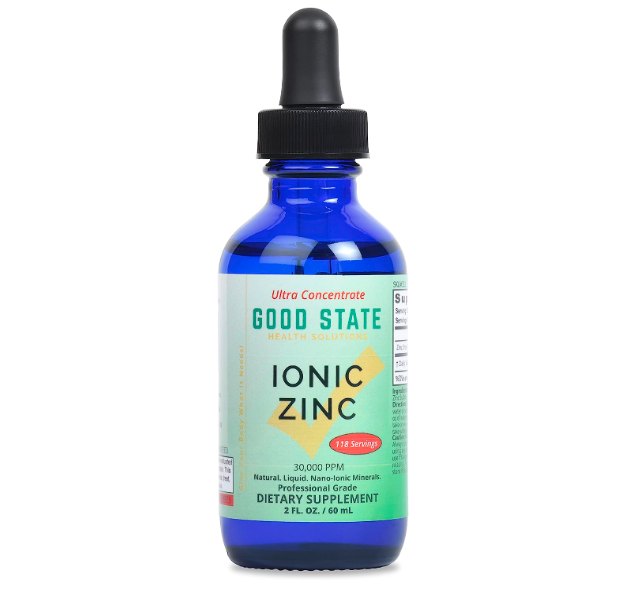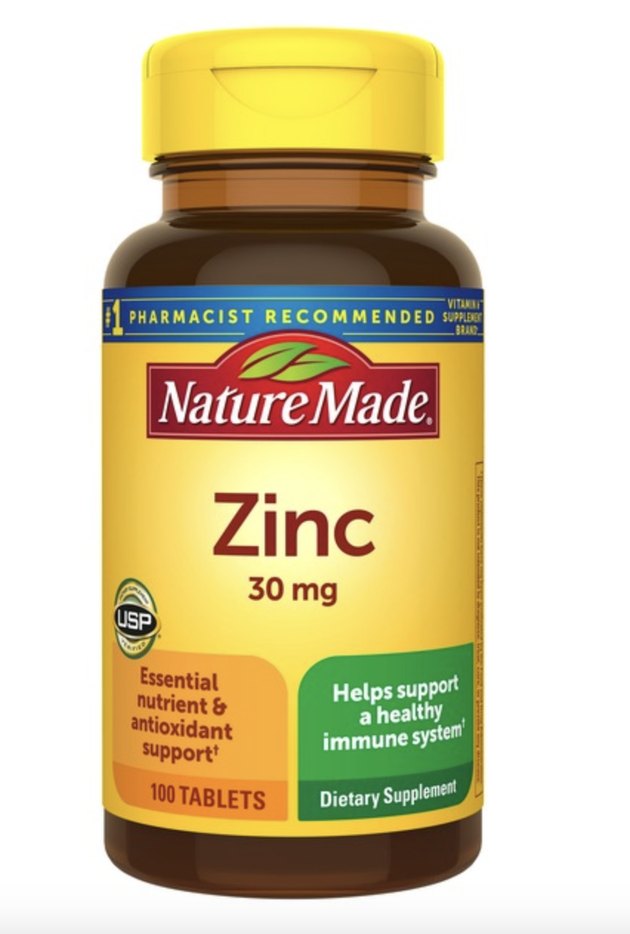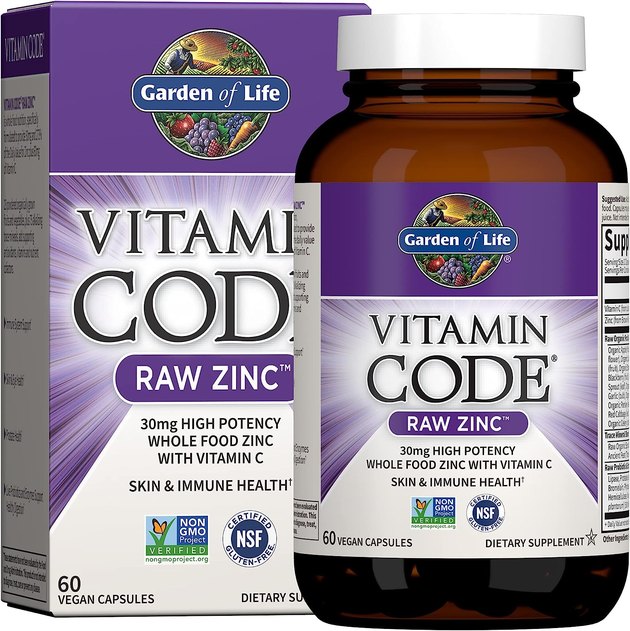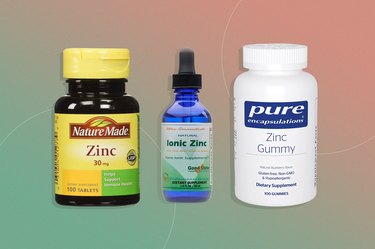
Zinc gets a lot of attention for its potential to treat colds. But this mineral isn't only necessary during cold and flu season.
Most of us get the zinc we need through our diets, according to the National Institutes of Health (NIH). There are exceptions though, where supplementing may be helpful. Plus, taking zinc may help speed up your recovery from a cold (more on that later).
Video of the Day
Video of the Day
If you're looking to supplement with zinc, here are some of the best options.
Our Picks
- Best Overall: Thorne Zinc Picolinate ($15.30, Amazon)
- Best Gummy: Pure Encapsulations Zinc Gummy ($23.70, Amazon)
- Best Liquid: Good State Natural Ionic Zinc ($22.99, Amazon)
- Best on a Budget: Nature Made Zinc ($4.99, Amazon)
- Best Vegan: Garden of Life Vitamin Code Raw Zinc ($11.19, Amazon)
The Many Benefits of Zinc
Zinc benefits your body in a few ways. "Zinc is an essential micronutrient that plays a vital role in various body functions," says Lisa Moskovitz, RD, CDN and CEO of NY Nutrition Group.
That includes supporting your immune system, healing wounds, DNA and protein synthesis and more. This nutrient also plays an important role in your senses of taste and smell, according to the Mayo Clinic.
One of the reasons zinc supplements have become so popular is because of the mineral's role in immune health, according to the Mayo Clinic. Taking zinc lozenges or syrup within 24 hours after the onset of symptoms has been shown to reduce the length of a cold, according to a February 2015 review in BMC Family Practice.
How Much Zinc Do You Need?
Most people get enough zinc from their diets, but older adults and other groups may be at risk for not getting enough zinc. The recommended daily value (DV) for zinc is 11 milligrams for adults and children ages 4 and older, according to the National Institutes of Health (NIH).
How We Chose
On our list, you'll find zinc supplements that have been tested by third-party organizations for quality and effectiveness. We also asked registered dietitians to share their favorite brands and products. We chose the zinc supplements on this list based on the following criteria:
- Third-party testing
- Type and concentration of zinc
- Additional nutrients and ingredients
Learn more about how we cover products.
How Effective Are Zinc Supplements?
Zinc supplements can be beneficial for immune support and wound healing, Moskovitz says. If your zinc levels are low, supplements are effective, per the Mayo Clinic.
Taking zinc can shorten the length of a cold so long as it's taken within 24 hours of when symptoms kick in, according to the Mayo Clinic. More research is needed to nail down which type of zinc supplement is most effective (and how much you need) to shorten a cold's duration, per the NIH.
Taking zinc may also be helpful in slowing the progression of age-related macular degeneration and may also help heal wounds in people with skin ulcers, according to the Mayo Clinic.
What to Look for in a Zinc Supplement
The vast number of available supplements can make choosing one feel overwhelming. Keep these considerations in mind as you make your selection:
- Third-party testing: Seeing that a product is assessed by independent organizations — such as ConsumerLab — or has a seal from USP or NSF "ensures your product is tested, safe, reliable and contains exactly what it says on the label," Moskovitz says. An RD or doctor can also make a recommendation, she notes.
- Zinc quantity: "Because it is possible to overdose on zinc, find a supplement that has around 30 milligrams or less per serving," Moskovitz recommends.
- Watch for fillers: If you're opting to take a chewable supplement, make sure it's not loaded with sugar. And, if there are any ingredients that you are allergic to, check they're not in the product.
1. Best Overall: Thorne Zinc Picolinate
Moskovitz recommends this product for two reasons: It's NSF Sport Certified, meaning it is tested for unsafe levels of several contaminants and it's guaranteed free of 200 substances banned by athletic organizations.
With Thorne supplements, you can also be sure you're getting your nutrients without artificial colors and ingredients. One capsule of this supplement contains 273 percent of your DV of zinc. This zinc supplement is also safe for people with allergies to gluten, soy and dairy.
2. Best Gummy: Pure Encapsulations Zinc Gummy
Pure Encapsulations is a trusted brand that makes a chewable zinc supplement containing 12 milligrams or 109 percent of your recommended daily value (DV). Moskovitz likes this supplement because it tastes good and is made with real fruit.
This is a good option for people with allergies, as it's gluten-free and doesn't contain eggs, tree nuts, peanuts or wheat. Each gummy has only 0.5 grams of sugar.
3. Best Liquid: Good State Natural Ionic Zinc
This drinkable zinc supplement allows you to take any dose of zinc you need.
One of the advantages of taking zinc as a liquid is that you can customize the dose. The recommended adult dose is 10 drops for a full 15 milligrams of zinc sulfate, and 5 drops for children over the age of 4 to meet daily needs.
To take it, simply mix the drops into water or another beverage and drink. You'll get 118 full servings per bottle, making this a budget-friendly option, too.
Just one note: This supplement may have a metallic taste, so try mixing it with a flavored beverage if the taste bothers you.
4. Best on a Budget: Nature Made Zinc
Nature Made is another trusted vitamin brand, and this low-cost zinc supplement is a great option for those who want quality without a hefty price tag.
This zinc supplement is USP-certified, meaning it's been tested to confirm it actually has the amount of nutrients it says are in it and doesn't have harmful levels of contaminants.
There are no artificial flavors, colors or preservatives added to this zinc supplement, and it's also gluten-free.
Nature Made supplements are generally easy to find in grocery stores and pharmacies in the vitamin aisle. It's recommended to take this zinc supplement with food and water.
5. Best Vegan: Garden of Life Vitamin Code Raw Zinc
Garden of Life Raw Zinc, and all of the brand's products, are made with whole-food formulas (which you can verify by looking at the ingredients list).
This supplement is NSF-certified for quality, and it's suitable for those on a gluten-free or vegan diet.
Along with zinc, this supplement also contains vitamin C and probiotics, and it's made without high heat to preserve the nutrients in the ingredients.
You won't find synthetic or filler ingredients in this blend, and the large capsules contain 273 percent DV of zinc, along with 67 percent of your DV of vitamin C.
If you can't swallow the pills, open the capsules and pour them into a flavored beverage.
Who Should Take Zinc Supplements
In most cases, your diet will deliver the zinc you need. There are plenty of foods high in zinc.
"It is not difficult to meet the RDA [recommended daily allowance] for zinc through diet alone," Moskovitz notes.
People ages 19 and up should get between 8 to 11 milligrams of zinc each day, according to the NIH. Here is the amount of zinc in several everyday foods, per the NIH:
- 1 ounce dried pumpkin seeds: 2.2 grams of zinc; 20% DV
- 3 ounces roasted turkey breast: 1.5 grams of zinc; 14% DV
- 1/2 cup cooked lentils: 1.3 grams of zinc; 12% DV
- 6 ounces Greek yogurt: 1 gram of zinc; 9% DV
If you want to take in the max amount of zinc, look to oysters. "Oysters are by far the richest source of zinc available with 74 milligrams of zinc per 3 ounces," Moskovitz says. That's 673 percent of your DV.
That said, even with zinc readily available from food, some people may have difficulties getting the zinc they need through their diet.
"Although zinc is prevalent in many commonly consumed foods, it is definitely most abundant in meat and seafood," Moskovitz points out. That puts vegetarians and vegans at a higher risk for zinc deficiency, she says.
And it's not just the lack of meat and seafood: Diets high in beans and grains (like many plant-based ones) mean taking in a compound that prevents zinc absorption, per the NIH.
There are other populations at risk for zinc deficiency too, such as people who are pregnant or lactating, people with GI disorders and adults over age 60, Moskovitz says. People with alcohol use disorder as well as people with sickle cell disease may also have deficiencies, according to the NIH.
Who Should Avoid Zinc Supplements?
Always check with your doctor or a registered dietitian before taking zinc (or any!) supplements, Moskovitz recommends. "Zinc supplements can interfere with certain medications including diuretics and antibiotics," she says.
Zinc supplements are generally considered safe to take, although nasal sprays, which are associated with a loss of smell, should be avoided, according to the Mayo Clinic.
But watch how much you're taking in. "It is possible to overdo zinc," Moskovitz says.
Taking too much zinc can lead to GI-related symptoms, such as indigestion and nausea as well as headaches. It also has the potential of lowering HDL (or "good") cholesterol and copper levels, according to the NIH.
Do not exceed 40 milligrams of zinc per day, which is the tolerable upper limit, per the NIH.
